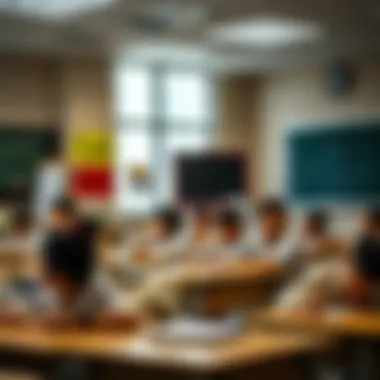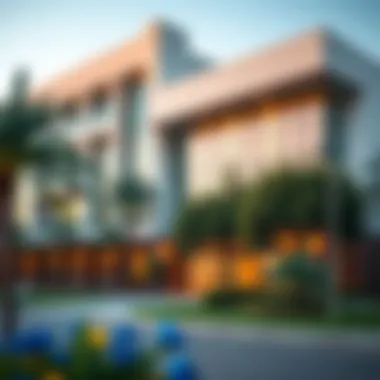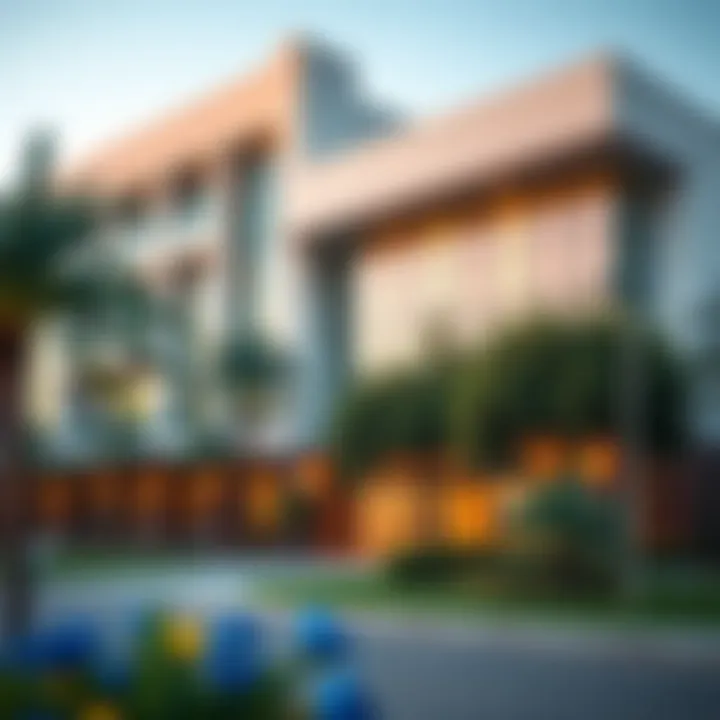Educational Landscape: Insights on Dubai Schools


Intro
Dubai's education system stands as a testament to the city's rapid development and its ambition to provide quality learning opportunities for its residents. Families, both local and expatriate, face a myriad of choices when it comes to selecting the right school for their children. With a mosaic of curricula, educational philosophies, and cultural influences at play, navigating this landscape can prove challenging yet rewarding.
In this article, we will unpack the various dimensions that define schooling in Dubai. From the types of schools and curricula to the overarching regulatory frameworks, the aim is to shed light on the factors influencing educational decisions. As the city continues to flourish, understanding the interplay between education and real estate becomes paramount for potential residents and investors.
This exploration will delve into current trends affecting education and how they correlate with the real estate market. By connecting dots between these domains, we aim to empower families and investors with the knowledge necessary to make well-informed choices in Dubai's educational landscape.
Foreword to Education in Dubai
Education in Dubai stands at a fascinating crossroads where tradition meets modernity, reflective of the city's own dynamic character. The intricate fabric of the educational landscape here is shaped not only by the local culture but also by a myriad of international influences. For potential residents and investors, understanding this landscape is critical for making informed decisions about schooling options for their children or tenants.
In recent years, the growth and diversification of schools in Dubai have sparked considerable interest. The education system here caters to a broad spectrum of needs, from locally-rooted curricula to international programs, making the city a melting pot of educational philosophies. This multifaceted system not only supports the learning needs of expatriates but also nurtures the cultural heritage of Emirati students.
Overview of the Educational System
The educational system in Dubai is primarily governed by the Knowledge and Human Development Authority (KHDA), which sets the standards for both private and public institutions. The system operates on a dual framework, encompassing both local and international curricula. Public education is predominantly free for Emirati children, emphasizing Arab culture and language, while private institutions often focus on alternative educational models and diverse curricula such as British, American, and International Baccalaureate.
Over the years, the emphasis has shifted towards raising educational standards to ensure that all students are equipped with the skills needed for a competitive global economy. Schools frequently undergo inspections by KHDA, whose reports are critical in evaluating a school’s performance and guiding parental choice. Transparency in school performance has become a treasure map for parents navigating the plethora of choices available.
In addition to the curriculum, vocational training programs are also rising in prominence, geared towards equipping students with practical skills that align more closely with the job market. This added layer enhances the attractiveness of Dubai's educational offerings, aligning them with the UAE's vision of a knowledge-based economy.
Demographics and Schooling Needs
The demographics of Dubai reveal a vibrant mix of cultures, with expatriates accounting for around 80% of the population. This diversity is reflected in the demand for various schooling options as families seek educational environments that not only align with their cultural backgrounds but also meet their academic expectations. Such a melting pot creates a unique set of challenges and opportunities within the educational sector.
It’s crucial to note that the rising number of expatriates has driven a significant increase in the demand for international schools. These institutions often serve as a bridge, offering curricula that resonate with families from different backgrounds, while also adhering to local regulations. As the population continues to evolve, schools are adapting to these changing needs, ensuring that they are not just places of learning but also centers for cultural exchange.
In summary, understanding the educational landscape of Dubai is paramount for families considering relocation, as well as for investors looking at the potential of educational institutions within the city. By recognizing the intricacies of the schooling options available and the demographics driving these choices, one can appreciate the depth and complexity that characterize education in this global hub.
Types of Schools Available
When discussing the educational infrastructure in Dubai, understanding the various types of schools available is vital. This aspect affects decisions made by expat families, local residents, and investors looking into real estate related to educational facilities. Each school type carries its own distinctive character, methodologies, and merits, shaping the learning outcomes for students. From public institutions funded by the government to a rich array of private and international schools, each option reflects the multicultural tapestry of this city. Families must consider these choices carefully, weighing the implications on education quality, accessibility, cultural integration, and personal goals.
Public Education Institutions
Public education in Dubai primarily serves local Emirati students. The public education institutions tend to follow the national curriculum, which emphasizes Arabic language and Islamic studies, alongside other core subjects. One notable point here is that these schools are often free for UAE nationals, making them a crucial part of the country’s educational strategy to promote cultural identity and heritage.
The structure of public schools varies in terms of facilities and resources. Many are undergoing renovations to enhance student learning environments. However, challenges such as overcrowding may persist. For expatriate families, enrolling their children in public schools can be tricky due to residency regulations that usually favor Emirates citizens. So, if you’re navigating school options, you might want to keep this in mind.
Private Schools: An Overview
Private schools in Dubai present a broad range of options, catering to diverse cultural backgrounds and educational philosophies. The private education sector has proliferated, with institutions offering curricula from various countries, such as the UK, USA, India, and more. Parents often appreciate the flexibility these schools provide in terms of tailored curriculums and extra-curricular activities.
In Dubai's private school landscape, meticulous considerations arise regarding tuition fees—often steep—and associated costs for uniforms, books, and other materials. Moreover, educational quality can widely differ, so prospective families may prefer to conduct on-site visits and speak with current students or parents before making any decisions. A strong focus on extracurricular activities is common, adding value to the educational experience.
International Schools: Diverse Curriculum Options
International schools contribute significantly to Dubai's educational environment, given the substantial expatriate community. International schools typically follow globally recognized curricula like the British, American, or International Baccalaureate. This model allows students not only to pursue education that aligns with their home country’s system but also fosters an environment of international camaraderie and cultural exchange.
Each international institution is an educational microcosm, where children from over a hundred different nationalities converge, sharing and learning from one another’s cultures. It’s common for these schools to provide a comprehensive approach, integrating language learning and critical thinking into their teaching practices. Additionally, many schools emphasize the development of soft skills, prepping students for global citizenship.
For parents, choosing an international school means keeping an eye on specific factors like academic performance, college placement rates, and school endorsements from recognized associations to ensure boundaries regarding educational excellence are maintained.
Ultimately, understanding the landscape of types of schools available in Dubai helps parents navigate an intricate network, ensuring they provide their children with the best educational opportunities available. Whether one opts for public, private, or international institutions, each choice serves to shape not just academic knowledge, but broader life skills that students will carry into adulthood.
"The variety in education types in Dubai reflects its vibrant, multicultural society. Families can find a schooling option that perfectly suits their needs and aspirations."
For further insights about these educational pathways, you can explore Britannica for an overview of global education systems or check Wikipedia for more specifics on schooling in the Arab Emirates.
Curriculum Frameworks and Standards
In the ever-evolving educational landscape of Dubai, understanding the curriculum frameworks and standards is pivotal. They shape not only the academic foundation of students but also influence the societal values and skills present in the community. This intricate web of educational models is designed to cater to a diverse population, ensuring that the needs of both expatriates and local families are met.


Multiple frameworks exist, each with distinct characteristics and benefits.
- They offer clarity on the content and competencies that students are expected to master during their schooling years.
- Different curricula align with students' future educational pathways, whether they intend to pursue further studies locally or internationally.
- Standardized frameworks provide assurance to parents regarding the quality and rigor of education their children receive.
Overall, educational frameworks not only guide teaching practices but also help in creating a common standard of learning, which is essential in a multicultural society like Dubai.
British Curriculum
The British curriculum is one of the most popular educational frameworks in Dubai, largely due to the presence of a significant expatriate community from the UK. This curriculum is structured in stages: the Key Stages, which span from early years education to secondary education. Its emphasis on critical thinking and analytical skills is designed to prepare students for IGCSE and A-level examinations.
This curriculum often fosters a deep understanding of subjects, as students engage in comprehensive study rather than superficial learning. Schools adopting this framework aim to instill a sense of academic rigor while also encouraging co-curricular activities, making them well-rounded individuals. Many parents value the British curriculum's flexibility, enabling students to transition smoothly to schools in the UK or other countries should the need arise.
American Curriculum
The American curriculum has also carved its niche within Dubai’s education system. Tailored to the needs of both local and expatriate families, this framework focuses on a holistic education approach. The structure typically includes a mix of core subjects that align with state standards and flexible elective options, allowing students to explore their interests.
Features of the American system include:
- Emphasis on continuous assessment through projects and presentations.
- Varied teaching methodologies that promote creativity and independent thinking.
- Grades that align with American high schools, easing transitions for families moving between the US and Dubai.
By integrating both academic and interpersonal skills, the American curriculum prepares students for competitive colleges and universities.
International Baccalaureate
The International Baccalaureate (IB) program stands out for its global relevance. It is recognized for developing inquiring, knowledgeable, and caring young people. The IB program encourages students to think critically and creatively while also promoting international-mindedness.
This framework includes three educational programs:
- Primary Years Programme (PYP) for education from ages 3 to 12.
- Middle Years Programme (MYP) for students ages 11 to 16.
- Diploma Programme (DP) for ages 16 to 19, culminating in an internationally recognized qualification.
The emphasis on intercultural understanding and respect positions IB students well for success in a globalized world. Schools offering the IB often cater to a diverse college-bound student body, further enhancing their appeal to parents.
Local Curriculum and Its Significance
The local curriculum in Dubai, developed by the UAE Ministry of Education, reflects the cultural and national values of the region. This curriculum is designed primarily for Emirati students, reinforcing the importance of Arabic language and local history.
In schools implementing this framework, students not only learn about their culture but also gain essential life skills that prepare them for the future.
The significance of the local curriculum lies in its role as a unifying factor amongst students from diverse backgrounds. It aims to create a strong sense of identity, positioning students to balance global citizenship with local traditions. Moreover, the local curriculum promotes bilingual competence, as students are taught in both Arabic and English, making them well-equipped to navigate a multicultural society.
"A strong local curriculum serves as the backbone to a society that aspires to balance modernity and tradition."
In summary, the educational frameworks present in Dubai offer rich options. They provide clarity in the competencies expected, accommodate diverse needs, and help families make informed decisions regarding their children’s education.
Admission Processes and Regulations
Understanding the admission processes and regulations within Dubai's educational landscape is crucial for families considering school options. The procedures and standards set by regulatory authorities significantly impact school choice for expatriates and locals alike. Navigating this labyrinth can seem daunting, but grasping the specifics can avoid missteps, ensuring a smoother transition into a new educational environment.
Regulatory Framework for Schools
Dubai boasts a structured regulatory framework intended to maintain educational standards and ensure a high-quality learning experience for all students. The Knowledge and Human Development Authority (KHDA) plays a pivotal role in overseeing the quality of education across public and private schools in the emirate. Its responsibilities include inspecting schools, issuing licenses, and setting educational policies that align with Dubai's vision.
Under this framework, schools must adhere to various guidelines that encompass curriculum delivery, teacher qualifications, and overall governance. Inspections performed by KHDA provide essential insights into each school’s performance, ultimately guiding parents in their decision-making. Notably, schools are categorized into different ratings ranging from Unsatisfactory to Outstanding, influencing not only enrollment trends but also property values in the vicinity.
"The role of KHDA in fostering a competitive yet nurturing educational environment cannot be overstated. Parents need to keep an eye on inspection reports before making enrollment choices."
Some regulatory aspects to consider include:
- Curriculum Approval: Schools are required to have their chosen curricula approved, ensuring they meet local educational standards.
- Compliance: Schools must comply with local laws regarding health and safety, ensuring a secure environment for students.
- Teacher Regulations: Teachers must often hold certifications recognized by Dubai's educational authorities, enhancing the quality of consent.
Typical Admission Procedures
When it comes to the nitty-gritty of admission, families encounter varying procedures depending on the school type. While some schools may have straightforward processes, others might present a more complex web of requirements and timelines.


Here are common steps families can expect during the admission process:
- Research and Shortlisting: Parents begin by researching schools that catch their interest, assessing aspects like curriculum, ratings, and proximity to home.
- Application Submission: Once a shortlist is prepared, families typically fill out an application form available on the school's website or at the administrative office.
- Required Documentation: Schools usually request specific paperwork, including:
- Entrance Assessments: Certain schools conduct entrance tests or assessments to gauge the child's readiness for the selected curriculum. These assessments can vary in content and format.
- Interviews: For some prestigious institutions, both parents and children might be invited for an interview as part of the admissions process. Here, schools often assess fit from both sides.
- Notification of Acceptance: After concluding interviews and assessments, families will receive acceptance letters detailing the next steps.
- Registration and Fees: Accepted families must register their children officially and pay the required fees to secure a spot.
- Birth certificate
- Medical records (vaccination history)
- Previous school reports or transcripts
- Proof of residency in Dubai
It's important to note that many schools in Dubai have specific deadlines for applications, usually aligned with the academic calendar. Families new to the emirate should keep these timelines in check to avoid being caught off guard.
By understanding the admission procedures and the governing framework, families can navigate Dubai's educational environment with more confidence, making informed choices that can greatly influence their children's future. For more detailed insights into specific schools and their admission requirements, valuable resources include KHDA's official website and School Finder.
Cultural Context of Education
Understanding the cultural context of education in Dubai is essential, as it plays a decisive role in shaping the educational experiences of students within this diverse metropolis. With a potpourri of nationalities calling the city home, tailoring educational provisions to meet the needs of various cultural backgrounds becomes imperative. This cultural tapestry does not merely enhance the learning environment; it fosters tolerance, respect, and a global perspective among students.
Impact of Multiculturalism on Schools
Multiculturalism can be viewed as a double-edged sword; it brings both opportunities and challenges. Schools in Dubai thrive in this melting pot. The mix of cultures means children are often exposed to different viewpoints and customs from a young age. This exposure nurtures open-mindedness and enriches their social interactions.
For educators, this multicultural environment necessitates a tailored pedagogical approach, integrating different cultural perspectives into curriculums. This practice includes:
- Incorporating world history and global issues into lessons.
- Organizing cultural exchange programs and events, allowing students to share their heritage.
- Promoting languages spoken within the school community, broadening communication.
Such measures not only help students feel seen and appreciated but also equip them with vital skills needed in the global job market. Thus, addressing the educational needs of an increasingly diverse student body can indeed be advantageous for future economic prospects.
"In a world of rapid globalization, embracing diversity is not an option, it’s a necessity."
Role of Arabic Language and Culture
Arabic language and culture occupy a significant place in the educational framework of Dubai schools. For expatriates and locals alike, learning Arabic can serve many purposes. On one hand, it is vital for navigating daily life in the UAE, while on the other hand, it caters to existential ties to the rich cultural heritage of the region. By being proficient in Arabic, students gain access to a wealth of literature, history, and traditions that might otherwise remain elusive.
Furthermore, the UAE government encourages schools to promote the Arabic language, mandating its inclusion in curriculums. This requirement means that even international schools have programs designed to help students understand and appreciate Arabic, ensuring the language isn't sidelined even in diverse environments. Additionally, schools often celebrate Arabic literature and poetry, offering platforms for students to express themselves in their native tongues.
Thus, blending Arabic heritage into education not only forms a bridge for expatriates but also reinforces the identity of local students. This cultural fabric threads through the lives of the youth, fostering shared understanding and community.
In summary, a deep appreciation of multiculturalism and the Arabic language enriches the educational landscape in Dubai. This creates a learning environment that both respects individual identities and nurtures a communal spirit, which is crucial for the city’s growth and cohesiveness.
Educational Trends and Innovations
In a rapidly changing world, educational trends and innovations play a pivotal role in shaping how young minds engage with their studies. By embracing new methodologies and technologies, the education system in Dubai reflects a commitment not only to quality education but also to preparing students for a future that is undoubtedly different from the past. This section will examine the importance of these trends in the context of Dubai, highlighting elements that benefit both students and the larger community.
Technological Advancements in Learning
The integration of technology within classrooms is not just a fad; itresonates deeply with the local and global shift towards digital literacy. Schools in Dubai are increasingly adopting tools like interactive whiteboards, tablets, and online learning platforms.
These advancements facilitate a more engaging and hands-on approach to education, making learning not only more enjoyable but also more effective. Here are a few ways that technology is transforming educational landscapes:
- Personalized Learning: Students can learn at their own pace, tackling subjects that challenge them or moving ahead in areas of proficiency.
- Access to Resources: With just a few clicks, students can access a trove of academic materials from around the world, enhancing their research capabilities.
- Collaborative Learning: Digital tools enable students to connect and collaborate with their peers across various schools, fostering a sense of community and teamwork.
Incorporating these technologies is more than just about having the latest gadgets; it represents a broader approach to education that champions adaptability and lifelong learning. As the saying goes, "Learn today, lead tomorrow."
Focus on Critical Thinking and Creativity
While technology is an undeniable asset, the emphasis on critical thinking and creativity marks a significant shift in education. Gone are the days of rote memorization; in today’s classrooms, the focus is on developing analytical skills and problem-solving abilities. This approach is particularly relevant in Dubai, where the educational landscape is as diverse as its population.
Promoting critical thinking involves encouraging students to ask questions, evaluate information critically, and approach problems from multiple angles. Here are some key aspects:
- Encouragement of Inquiry: Students are prompted to ask questions rather than simply accept what they are told. This can lead to deeper understanding and a more engaged learning experience.
- Project-Based Learning: This strategy involves applying knowledge to real-world scenarios, fostering both teamwork and creativity.
- Cultural Context: Schools in Dubai harness the rich cultural diversity to explore various perspectives, encouraging students to think outside the box.
By nurturing these skills, schools are effectively preparing students for a world that values innovation and adaptability over mere information retention. As a famous educational theorist once said, "Education is not the filling of a pail, but the lighting of a fire."
"The greatest benefit of education is not knowledge, but the ability to think critically and adapt in an ever-changing world."
For more insights on educational innovations:


- Wikipedia on Educational Technology
- Britannica on Critical Thinking
- Reddit Educational Innovations Community
Challenges Facing the Educational Sector
The educational sector in Dubai is not just about the shiny new buildings and the plethora of options available to families. Beneath this surface lies a complicated lattice of challenges that warrant careful examination. Understanding these complexities is critical not just for parents considering school options, but also for investors and property managers who need to keep a pulse on factors that influence families’ decisions on where to live and, subsequently, which schools to choose.
Educational Disparity Among Communities
A significant issue plaguing the educational landscape in Dubai is the educational disparity among different communities. This disparity often manifests in resource distribution, quality of teachers, and the availability of extracurricular programs. Families from affluent neighborhoods frequently have access to a higher standard of education compared to those in less developed areas.
- Public vs. Private: Public schools, while theoretically accessible to everyone, can struggle with overcrowding and limited funding. On the flip side, private schools often offer advanced facilities but at a premium price, leaving some families in a bind, feeling like they have to dip into their savings just to provide their children with a quality education.
- Cultural Factors: Certain communities are also more likely to prioritize education, driven by cultural values or economic pressures. This depth of commitment affects how resources are allocated, with some schools benefiting from strong parental involvement, while others face challenges with less engagement.
Ultimately, this creates a division not just in educational attainment but also in the opportunities available to children across different backgrounds.
Navigating School Fees and Affordability
Another pressing issue tied closely to the educational sector in Dubai is the navigating school fees and affordability. Tuition costs have skyrocketed in recent years, leading to rising concerns among residents about financial planning for education. Families often feel like they are walking a tightrope, balancing their budget while attempting to secure their children’s future.
- Tuition Rate Trends: To paint a clear picture, according to recent reports, tuition fees can range from 5,000 AED to over 100,000 AED per year, depending on the school's reputation and curriculum offered. This complexity can lead to families scrimping on other essentials just to afford a decent education, often forcing them to look for alternative schooling options or assistance.
- Hidden Costs: Many parents are surprised to find that tuition fees do not include all the costs associated with schooling. Additional expenses may crop up in the form of activity fees, transport fees, and costs for uniforms and books. Families need to be aware and plan accordingly, ensuring they find a balance between affordability and quality.
- Scholarship and Financial Aid Opportunities: Luckily, some schools provide scholarships or financial aid options to lessen the burden. However, competition can be fierce, and the process can be challenging to navigate. Educating families about these options is vital, as they can potentially help bridge the affordability gap.
"Securing a quality education for children in Dubai can feel like a daunting task, especially when balancing the rising costs and varying standards of schools across communities."
Future of Schools in Dubai
The future of schools in Dubai stands at a fascinating crossroads, where innovation meets tradition. This topic holds significant weight in this article as it encapsulates the progressive transformations set to shape the educational landscape. Through government initiatives and societal shifts, the educational framework in Dubai is evolving, responding to both local and global demands. Investors, property managers, and home buyers need to understand these elements to navigate the increasingly competitive real estate market influenced by local schooling options.
Government Initiatives and Investment
The role of the government in shaping education in Dubai cannot be overstated. Various initiatives are underway to enhance school quality and accessibility, making the city a beacon for educational excellence. By investing heavily in facilities, teacher training, and curriculum development, the Dubai government aims to establish a robust educational system that caters to its diverse population. For instance, the Ministry of Education has introduced programs focused on integrating technology into classrooms, offering metrics for assessing student performance, and encouraging schools to partner with private sectors.
- Investment in Infrastructure: New state-of-the-art schools are cropping up, equipped with the latest technology and teaching tools. This not only improves the learning environment but also attracts families looking for high-quality education options.
- Policy Frameworks: The government is also making strides in regulatory frameworks, ensuring that schools meet high educational standards. This includes rigorous accreditation processes for private institutions and periodic evaluations to maintain educational integrity.
Such initiatives lay the groundwork for a future where educational choices in Dubai are world-class, beneficial for both local families and expatriates. Investors should keep a keen eye on these evolving dynamics, as they directly influence the desirability of various neighborhoods and consequently, property values.
Shifting Societal Expectations from Education
In tandem with government efforts, societal expectations around education in Dubai are transforming. Local and expatriate communities increasingly prioritize holistic student development over rote learning. There’s a growing emphasis on critical thinking, creativity, and emotional intelligence—skills viewed as essential for success in an ever-changing global economy.
- Cultural Integration: Parents are pushing for curricula that incorporate cultural understanding, preparing students for a diverse workplace. Schools that offer programs fostering intercultural dialogue find themselves in high demand.
- Student-Centric Approaches: The shift towards personalized learning is evident. Parents want schools to tailor education to individual student needs, recognizing that each child learns differently. This has prompted schools to adopt various teaching methodologies—such as blended learning and project-based activities—that address these diverse learning styles.
As expectations shift, potential residents and investors must consider these factors when evaluating schools within various communities. Schools that adapt to these societal changes are likely to thrive, making properties nearby appealing to families who prioritize educational quality.
The evolving narrative of education in Dubai reflects not just a response to immediate needs but also a visionary approach towards the future, aimed at creating well-rounded citizens.
The confluence of government initiatives and changing societal expectations represents a compelling landscape for education in Dubai. Investors and property managers should recognize that schools are not merely institutions; they are pivotal to community identity and value, influencing property trends in the region.
End: The Educational Horizon of Dubai
In wrapping up our examination of the educational landscape in Dubai, it’s clear that the horizon of education here is not just expansive but also increasingly inclusive and innovative. This conclusion serves as a summation of the intricacies surrounding the educational choices available in a culturally diverse context. Importantly, it highlights how intertwined the future of education is with societal needs and global trends.
The central elements we’ve explored are critical for families and investors considering a foothold in this vibrant city. Understanding the varied types of educational institutions—be it public, private, or international—allows parents to make informed choices that align with their children's aspirations and values. The fluctuating metrics brought on by government initiatives and community expectations further shape the educational narrative, urging families to stay alert and involved.
"Education is the most powerful weapon which you can use to change the world." – Nelson Mandela. This quote resonates deeply within Dubai’s educational sphere, showcasing how educational investments today can yield profound societal benefits tomorrow.
Overall, the culmination of competitive admissions, diverse curricula, and the influence of cultural dynamics collectively pave the way for a robust educational environment that not only meets immediate needs but also adapts to future challenges. This prospect fosters a sense of optimism—residents and investors alike can look beyond mere numbers to see the potential for growth and enrichment in their educational investments.
Summary of Key Insights
Throughout the article, several key insights emerge:
- Diverse School Options: The availability of different types of schools caters to a broad audience, providing families with multiple avenues for their children’s education, from local curricula to international standards.
- Government Liaisons: Engaging with various initiatives and regulations from local bodies can enhance the educational landscape and provide clearer paths for prospective students and their families.
- Cultural Integration: Arabic language and cultural studies integrate into the curriculum, enriching the learning experience for expatriate and local children alike.
- Technological Trends: Advances in technology play a pivotal role in shaping modern educational practices, emphasizing learning that goes beyond books and fosters critical thinking.
Considerations for Residents and Investors
Prospective residents and investors should weigh the following factors:
- Educational Needs Assessment: Understanding the specific educational needs of your family or clientele helps in selecting a suitable school, which can ultimately dictate long-term satisfaction.
- Real Estate Decisions: Areas with reputable schools are often in higher demand, which can significantly affect property values.
- Investment in Future: Education is not merely a cost; it’s an investment that impacts the community’s stature and growth potential. The more robust the educational framework, the higher the chance for socio-economic advancement in the area.
- Stay Informed on Trends: As the educational landscape evolves, so do the expectations from both schools and families. Keeping up with changes is vital.
In essence, as Dubai continues to define itself on the global stage, the educational sector will also need to evolve. Those who can navigate this complex environment with foresight and informed decisions are likely to reap unique benefits, both in education and real estate.















